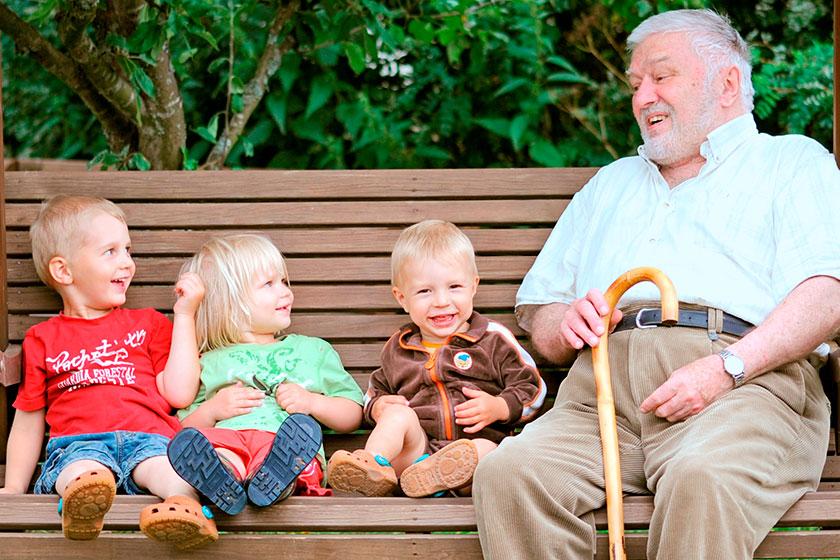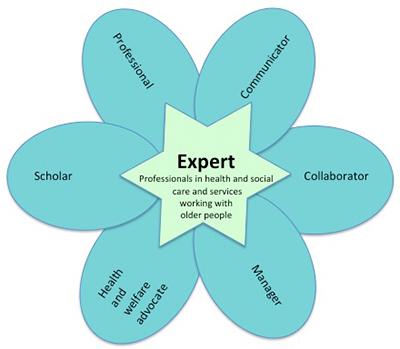
Population ageing is a common issue around the Europe. The number of older people is growing and by the year 2030 every third person in the EU will be more than 60 years of age. (DART 2012). Ageing affects the entire society and it will also challenge social and health care services. The growing number of the oldest age groups will indicate increasing need for social and health care services in the future. Moreover, at the same time care services and environments are changing and becoming more diverse, there is an obvious need for new kind of social and health care expertise.
European level cooperation in developing competences in active ageing is undeniable. International cooperation in competence development is needed to enhance the quality of services and to improve the attractiveness of older people care. European collaboration related to ageing is also beneficial when aiming to increase the mobility of workforce in social and health care services. Sharing common competences and expertise in active ageing provides more opportunities for future professionals to work in different international environments.
ELLAN unites European higher education institutions
ELLAN (European Later Life Active Network) project connects Higher Education Institutions extensively around the Europe. The consortium includes 26 partners from 25 European countries. ELLAN project (2013–2016) is funded by the EU´s Lifelong Learning Programme and coordinated by Savonia University of Applied Sciences, School of Health Care (Finland).
ELLAN project promotes European collaboration and exchange of good practices related to working with ageing population. ELLAN reconstructs the diverse educational approaches by developing an agreed European Core Competences Framework (ECCF) for working with older people. During the project the educational network is also sharing innovations in teaching and learning as well as identifying factors that may influence students to choose to work with older people in the future.
Developing competencies through research
The development of the ECCF is based upon five studies which were carried out during the 1st and 2nd year of the project: (1) Literature review exploring competences required in working with older people; (2) Qualitative research focusing on older people’s perceptions about required competences of professionals; (3) Quantitative study exploring professionals’ views of competences needed to support older people; (4) Quantitative research of factors influencing health and social care students’ views of older people; (5) Identification of best practice and innovative teaching and learning methods encouraging students to choose to work with older people.
The aim of the literature review was to find out which competences of the social and health care professionals working with older people related to the CanMEDS roles are described in the literature. CanMeds model was chosen to be the basis for the competences of ECCF. CanMEDS framework was originally formulated to describe the abilities physicians have to have in order to meet the health care needs of the people they serve. These abilities are grouped thematically under seven roles. A competent physician seamlessly integrates the competences of all seven CanMEDS roles. The CanMEDS roles are Medical Expert (the integrating role), Communicator, Collaborator, Leader, Health Advocate, Scholar, and Professional. The overarching goal of CanMEDS is to improve patient care. The model has been adapted around the world, both within and outside the health professions (Frank et al. 2014). (Figure 1).

A total of 228 studies were found. According to the findings, found competences were in general directed to a particular healthcare worker with a wide variety of competences in the different roles. To get insight in the generic competences, a secondary analysis was conducted in which 38 studies were included. The research question was: which generic competences of health and social professionals related to the CanMEDS roles are described in the literature? The conclusion of the literature was that the care and support of older people is very complex. A multidisciplinary team approach is necessary. Collaboration and communication are essential competences to optimize the team approach but also to respond to the individual needs of older persons. Moreover, collaboration with the older person is important. Sometimes communication with older people requires special skills. The CanMEDS roles offers a framework for the needed competences. However, multicultural competences need to be added, and special attention has to be paid to technological competences and the recognition of older people abuse. (Roodbol & Dijkman 2016.)
Attitudes of health and social care students towards older people and also their perceptions of working with older people were examined in a survey. Undergraduate health and social care students (n=955) from five different European countries completed two widely used questionnaires: Attitudes towards Older People Scale (Kogan 1961) and Student´s Perception of Working with Older People Scale (Nolan et al. 2006). According to the results student´s attitudes were generally very positive towards older people. Those with least experience with older people displayed more negative attitudes. However, high reported experience with older people was not conclusively linked to positive attitudes. The main result of the study pointed out the apparent indecision among students to work with older people or choose careers of working with them in the future. (Coffey et al. 2015.)
Older people’s perceptions about the required competences of professionals working with older people were collected by interviews in six of the partner countries. The partners selected a convenience sample of 16 participants (N=96) and used semi-structured interviews for data collection. A common interview script was followed and data analysis was conducted using thematic analysis (Braun and Clarke, 2006). Four major themes were identified: (1) recognizing older people’s individuality as well as their personal and social background; (2) effective communication and positive relationships between professionals and older people; (3) technical competence and expertise as well as team work; (4) vocation, commitment and ethical recommendations. The development of these competencies has potential to improve the quality of care delivered by health and social care professionals to older people. (Soares 2015.)
International cooperation in competence development is needed to enhance the quality of services and to improve the attractiveness of older people care.
Social and health care professionals’ perspective to the competences related to older people was collected by a questionnaire in six partner countries (N=885). The quantitative method used was based on the modified Caring Nurse – Patient Interactions Scale (CNPI-70). The results showed that professionals perceive that it is important to encourage older people to believe in themselves, to motivate them, to acknowledge their potential, to give hope, help and support when needed. Professionalism in care of the older person was experienced as crucial. Health and social care professionals regard as important collaboration, risk assessment and the encouragement of autonomy. A central theme was accepting aging as a physiological process and not just a disease. (Felsmann & Andruszkiewicz 2015.)
A study to identify innovative good practices in education for gerontology was carried out in order to find learning approaches which could positively contribute students to choose a career in gerontology. A template was developed, based on the criteria for innovation and the Senses Framework as described by Nolan et al. (2002). The template was distributed to Higher Education Institutions providing education in Gerontology in five partner countries. Twenty-three templates were completed and analysed. According to the results, innovative teaching methods that take into account the needs of students were found and structured by Miller’s educational model for competence-based learning. The selected best practices will be disseminated throughout Europe. To conclude the study envisaged that the educational practices identified could positively influence students’ attitudes and decisions about working with older people. (Schoofs 2015.)
European Core Competences Framework (ECCF)
The European Core Competences Framework is based on the view that professionals are working in different roles while working with older people. The framework describes the minimum set of competences that constitutes a common baseline for all professionals in social and health care working with older people. The developed competences are described for the roles of CanMEDS model (Figure 1). The competences are formulated on the European Qualifications Framework (EQF) level 6 (Bachelor) and 7 (Master). The ECCF will be formulated by bringing together the results of the studies described above and verified by using Delphi technique, involving 24 experts from 8 countries in order to find consensus of the developed framework. Following the CanMeds model seven roles will be described: expert, communicator, collaborator, organizer, health and welfare advocate, scholar and professional. (Dijkman & Roodbol 2015.)
Conclusion
The ECCF can be used in developing curricula of social and health care professionals. The desired outcome of this project is improved quality of higher education of social and health care professionals working with older people. The ECCF will be presented at the 23rd Nordic Congress on Gerontology in Tampere, Finland, June 2016, and will be available at the project website after that.
Writers
Jukka Aho, Senior Lecturer, MNSc., Savonia University of Applied Sciences, jukka.aho(at)savonia.fi
Marjut Arola, Principal Lecturer, Lic.Soc.Sc., Karelia University of Applied Sciences, marjut.arola(at)karelia.fi
Irma Mikkonen, Principal Lecturer, PhD, Savonia University of Applied Sciences, Irma.mikkonen(at)savonia.fi
[vc_tta_accordion active_section=”0″ no_fill=”true” el_class=”lahteet”][vc_tta_section title=”References” tab_id=”1458134585005-b3f22396-5506″]
Braun, V. & Clarke, V. (2006). Using thematic analysis in psychology. Qualitative Research in Psychology 3, 77-101.
Coffey, A., Buckley, C., Gaidys, U., Sansoni, J., Arola, M., Deimante-Hartmane, D., Corvo, E., Auer, S., Petersen-Ewert, C., & Tyrrell, M. (2015). Beliefs of students about growing older and perceptions of working in gerontology. Nursing older people. The journal for professionals working in gerontological care 27 (1), 33-37.
DART – Declining, Ageing and Regional Transformation 2012. Final report. http://www.dart-project.eu/fileadmin/OrdnerRedakteure/0103_Achievements/DART_final_report_web.pdf. Accessed 23.2.2016.
Dijkman, B. & Roodbol, P. (2015). European Competence Framework for working with older persons by professional´s health and social care. Report draft.
ELLAN – European Later Life Active Network. Accessed 23.2.2016 http://ellan.savonia.fi/
Felsmann, M. & Andruszkiewicz, A. (2016). The opinions of health and social care professionals on important competencies in caring for older people. Report draft.
Frank, J.R., Snell, L.S. & Sherbino J. (eds.) (2014). Draft CanMEDS 2015 Physician Competency Framework – Series III. Ottawa: The Royal College of Physicians and Surgeons of Canada; 2014 September. Accessed 6.4.2016 http://www.royalcollege.ca/portal/page/portal/rc/common/documents/canmeds/framework/canmeds2015_framework_series_III_e.pdf
Kogan, N. (1961). Attitudes toward old people: the development of a scale and an examination of correlates. Journal of Abnormal and Social Psychology 63, 44-54.
Nolan, M.R., Brown, J., Davies, S., Nolan, J. & Keady, J. (2006). The Senses Framework: improving care for older people through a relationship-centered approach. Getting research in Practice (GRiP) Report No 2. Accessed 3.4.2016 http://shura.shu.ac.uk/280/
Roodbol, P.F. & Dijkman, B. L. (2016). Generic competences for health and social workers working with older persons. Literature Review: A secondary analysis. Report draft.
Schoofs, G. (2015). Motivating Health and Social Care students to choose a career in Gerontology through innovative education. Report draft.
Soares, C. (2015). Older people’s views on professional competences. Report draft.[/vc_tta_section][/vc_tta_accordion]



